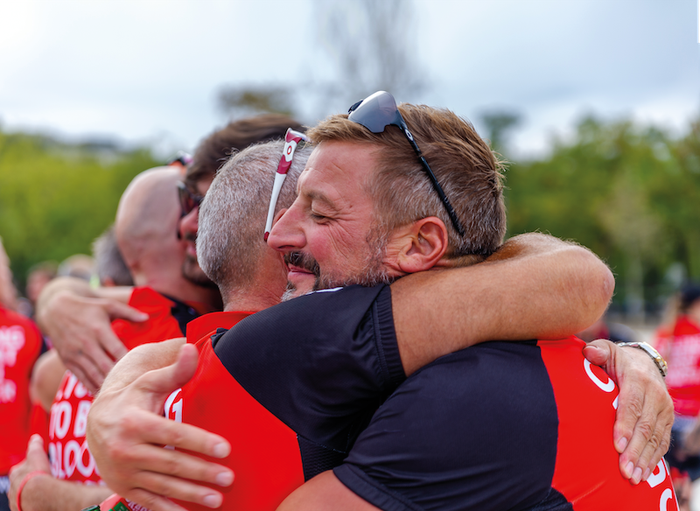Our strategy: How we're going to build our community
As we continue with our series of blogs explaining our work around our strategy, today we look at how we plan to reach more people affected by blood cancer.

The power of community
Our community has always been, and always will be, the heart and soul of all we do as a charity.
In our recent blog, we set out our vision of beating blood cancer. We also said:
We won’t be able to beat blood cancer without a community of knowledgeable, empowered people connected to each other and to Blood Cancer UK
Remaining close to the needs of our community means we’re better able to understand the issues that really matter to them. It means we’ll fund research that makes a big difference and advocate for the change that our community needs.
But we’re not currently reaching everyone affected by blood cancer.
So we wanted to take some time to think about how we could extend our reach, to engage with more people affected by blood cancer and really place community building at the heart of our mission.
Community building
We think that we currently reach less than half of those affected by blood cancer. This means that most people affected by blood cancer don’t know about us and aren’t able to access our services.
There are 250,000 people living with or after blood cancer in the UK. Each year, 40,000 people are diagnosed with blood cancer. Yet many of them have never heard of Blood Cancer UK. To help us reach them, we have to develop services that will make lives better or easier, or help people manage and cope when they need it most.
Meeting the biggest needs
People living with blood cancer have complex needs. Many may be marginalised in some way too, whether because of reduced access to digital skills and tools, or because current systems inherently disadvantage people of different backgrounds and communities.
We know we have to focus on where we can make the biggest difference to people, with inclusion and equality at top of mind. We think these are the three areas where we can have that biggest impact:
1) At the point of diagnosis, including needs such as:
- Accessing clear information about diagnosis and treatment options
- Knowing why and how to advocate for myself
- Being able to understand and manage significant risks relating to blood cancer or treatment, such as infections or sepsis
- Being able to do each of these things regardless of culture, religion, language, literacy level, age or socio-economic status.
2) During treatment, including needs such as:
- Receiving equal access to the best treatments
- Managing practical, childcare, employment or financial barriers
3) Relapse / disease progression / treatment not working, including needs such as:
- Being able to recognise and understand any changes to your body over time, so that signs of relapse or progression can be identified early to allow for the best possible outcome.
We also noted that in the current climate, Covid-19 and infection risk was a significant need for our community that we needed to continue addressing.
Nurturing our existing community
Time and time again, members of our community tell us how passionate they feel about contributing to our work through supporting other people with blood cancer, being actively involved in influencing change , and fundraising for Blood Cancer UK. For many, this is an opportunity to give something back to the charity, provide hope for others, or to simply be part of a community with a sense of purpose.
The insights our community bring are invaluable, allowing us to gain understanding about different experiences that will shape our work in the most meaningful and impactful ways. The depth and honesty with which our community can communicate about blood cancer has the potential to resonate far wider too – in spheres of influence like the NHS or government, and with other people affected by blood cancer who might need support.
It’s crucial that we develop opportunities for our community that are the most accessible, inclusive and rewarding, and which allow them to really help us in our mission, whether via our services, volunteering, campaigning or fundraising. Most importantly, we have to keep on listening to what our community want to do to help.
Teaming up with healthcare professionals
Healthcare professionals have an important relationship with people with blood cancer, and are instrumental in sharing our information and services with the blood cancer community. We are very clear that our work with clinical teams needs to be more focussed on how we can, together, improve the lives of people living with blood cancer.
The healthcare professionals that we work with are committed and engaged, but are we are not reaching everyone, or every hospital, involved in blood cancer patient care. We know that not all healthcare professionals in our networks know about everything that we offer to them and their patients.
Working with healthcare professionals, we can identify areas where potential products or services can add the most value, both to them and their patient groups.
Our services should underpin the work of healthcare professionals, reduce their workload and/or provide significant value in a way that enables them to spend more time focused on caring for people with blood cancer.
Over the last few years, clinicians have signposted their patients to our up-to-date, reliable covid-19 information. There are opportunities for Blood Cancer UK to do this in other areas too, and to be a source of insight, information and support for clinical teams and their patient groups. This will also enable key (potentially lifesaving) messages to be shared with the blood cancer community when they need it most.
If you are someone living with blood cancer or a healthcare professional, and you have thoughts on the direction of Blood Cancer UK, we’d love to hear from you – contact our Strategy Team.
